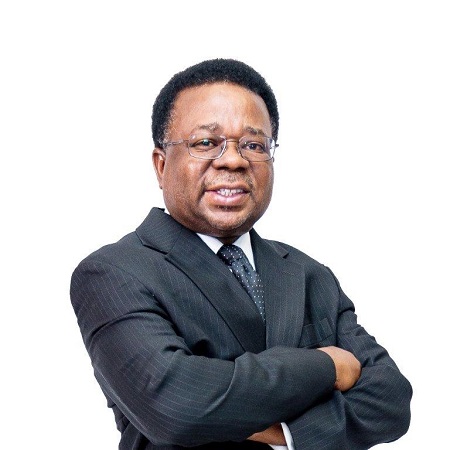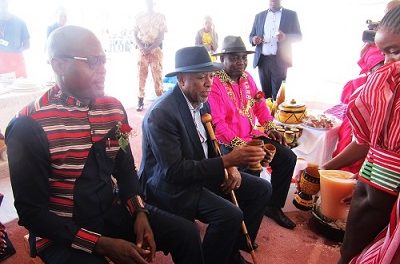The Chief Executive Officer of the Government Institutions Pension Fund (GIPF) Mr David Nuyoma has reacted by writing a statement in response to Mr Job Amupanda’s comments recently published on social media.
Amupanda, who is the mayor of Windhoek, uses the penname ‘Etondo lyaNehale’ (The testicle of Nehale) to criticize government institutions. In the current episode he accused the GIPF of being an institution serving the interests of the elites and corporate companies while neglecting the Fund’s members.
Below is the statement of Nuyoma:
“The GIPF has taken note of the unfortunate social media post made by the City of Windhoek mayor, Dr Job Amupanda on the design and benefits of the Fund which carried a number of factually inaccurate and/or misleading assertions about the Fund. The Fund would therefore like to correct the numerous inaccurate assertions made in the post and provide clarity and truth on those specific matters.
- “When you retire, you only get 1/3 of your pension money, the 2/3 remains with GIPF”
There is nothing sinister about this. Like all pension funds in Namibia, GIPF is not allowed by the law to pay out more than 1/3 of the pension money when a member retires. The 2/3 is, by law, required to buy a monthly pension for the retired member. Meaning, in return of the 2/3, GIPF undertakes to pay monthly pension to the retired member every month for the rest of his/her life (i.e. until the retired member passes away).
- “If you die, your remaining 2/3 does not go to your family or children, it is swallowed by the GIPF”
This is not true. GIPF’s monthly pension is guaranteed for five years. Meaning, should the retired member pass away within five years of retirement, the entire monthly pension is transferred to the surviving spouse for the remainder of the guaranteed period. In addition to the above, the surviving spouse also starts getting a monthly pension equivalent to 50% of the monthly pension that the retired member was getting before he/she passed away. Again, this pension is paid to the surviving spouse every month for the rest of his/her life (i.e. until the spouse passes away).
If a retired member dies without leaving a spouse, the value of his/her pension for the remainder of the guaranteed period is, by law, paid out to his/her dependents and nominees.
Over the past financial year, the GIPF paid out N$ 4,9 billion dollars in benefits whilst receiving N$ 4,3 billion dollars in contributions.
This monthly income is guaranteed for life and is subject to regular increases determined by the Board of Trustees.
- “When you retire, GIPF no longer pay you 80% of your salary as it should. This has now been reduced to only 50% of your salary”
We have no idea where the Mayor got 80% from as no law nor the rules provide for it. The GIPF does not use 50% or 80% to calculate the monthly pension. GIPF is a defined benefit fund whose benefits are paid as provided for in its approved rules; so upon retirement, the GIPF member’s total retirement benefit is calculated by using the following formula: The Member’s final salary x Member’s term of pensionable service x 2.4%.
Compared to similar defined benefit Funds in Africa and globally, the above formula, more specifically the accrual rate of 2.4% used by the GIPF provides a benefits level and income replacement ratio that is amongst the top in the world.
- “It is difficult to borrow money from your GIPF pension while you are alive, like the case with others, to build your house”
GIPF members do not have to wait until retirement to buy a house. All GIPF members are entitled to borrow GIPF’s money for housing purposes. In 2011, GIPF established a trust fund called First Capital Housing Fund through which any GIPF member can borrow money to acquire and/or build a house at interest rates and flexible terms as prescribed by law.
To date, GIPF has invested N$ 1.5 billion in this fund, which continues to provide housing loans to GIPF members throughout Namibia. The GIPF members are therefore enjoying this housing loans scheme whilst keeping their pension balances untouched. Meaning, when they retire, their pension is intact and they also have houses.
In addition, GIPF through First Capital Housing Fund also provides loans to Municipalities to install infrastructure (land servicing) such as roads, sewer lines, water pipes and electricity. Furthermore, noting that there is an acute shortage of housing in Namibia, GIPF has also invested in the servicing of land and construction of houses throughout Namibia.
The investments that the Fund makes on behalf of its members are guided by its investment policy and leading global practices. The Fund is audited on an annual basis and is reviewed by an Actuary on a regular basis. GIPF is also guided by regulations that guide the Fund’s investment strategy. One of those regulations is Regulation 13.
In terms of Regulation 13, as prescribed by NAMFISA, GIPF is mandated to invest 45% in local investments. The investment philosophy has proven to be effective and fruitful for both the Fund and for the country, which is evident by the growth of the Fund’s asset base from N$109.3 billion in April 2020 to N$125.4 billion by November 2020.
The GIPF continues to operate in a completely transparent manner, where any member of the Fund or member of the public can access all detailed information on how the Fund operates, what benefits are available to members, and where GIPF’s money is invested.
The GIPF is cognizant of the responsibility to guard and grow the Fund for the sake of 101,000 members and 40,000 pensioners to ensure that members’ funds are well stewarded, ensuring incomes and guaranteeing benefits for lifetimes.”
In the photo: Mr David Nuyoma, CEO of GIPF







